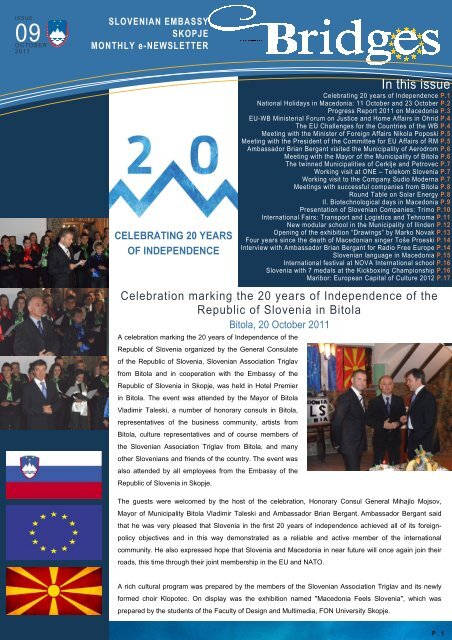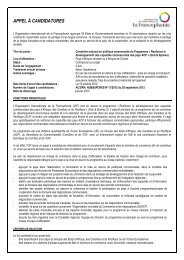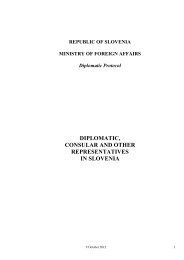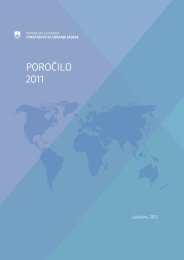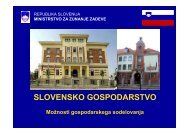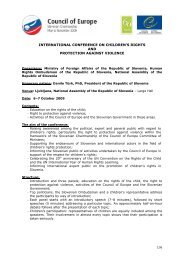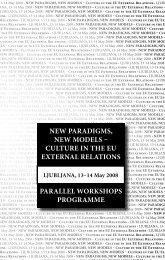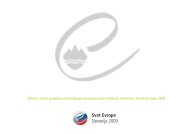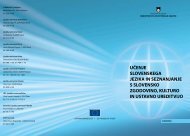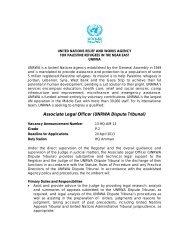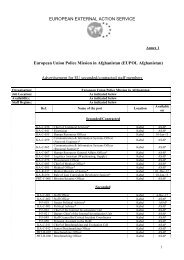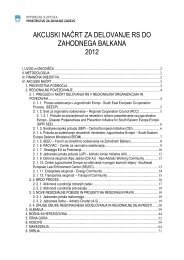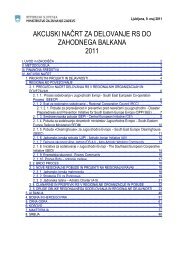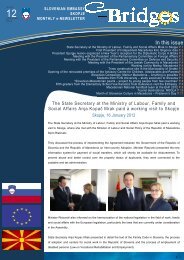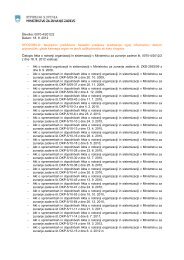Newsletter October 2011
Newsletter October 2011
Newsletter October 2011
You also want an ePaper? Increase the reach of your titles
YUMPU automatically turns print PDFs into web optimized ePapers that Google loves.
I S S U E<br />
09<br />
O C TOBE R<br />
2 0 1 1<br />
SLOVENIAN EMBASSY<br />
SKOPJE<br />
MONTHLY e-NEWSLETTER<br />
CELEBRATING 20 YEARS<br />
OF INDEPENDENCE<br />
Celebration marking the 20 years of Independence of the<br />
Republic of Slovenia in Bitola<br />
Bitola, 20 <strong>October</strong> <strong>2011</strong><br />
A celebration marking the 20 years of Independence of the<br />
Republic of Slovenia organized by the General Consulate<br />
of the Republic of Slovenia, Slovenian Association Triglav<br />
from Bitola and in cooperation with the Embassy of the<br />
Republic of Slovenia in Skopje, was held in Hotel Premier<br />
in Bitola. The event was attended by the Mayor of Bitola<br />
Vladimir Taleski, a number of honorary consuls in Bitola,<br />
representatives of the business community, artists from<br />
Bitola, culture representatives and of course members of<br />
the Slovenian Association Triglav from Bitola, and many<br />
other Slovenians and friends of the country. The event was<br />
also attended by all employees from the Embassy of the<br />
Republic of Slovenia in Skopje.<br />
In this issue<br />
Celebrating 20 years of Independence P.1<br />
National Holidays in Macedonia: 11 <strong>October</strong> and 23 <strong>October</strong> P.2<br />
Progress Report <strong>2011</strong> on Macedonia P.3<br />
EU-WB Ministerial Forum on Justice and Home Affairs in Ohrid P.4<br />
The EU Challenges for the Countries of the WB P.4<br />
Meeting with the Minister of Foreign Affairs Nikola Poposki P.5<br />
Meeting with the President of the Committee for EU Affairs of RM P.5<br />
Ambassador Brian Bergant visited the Municipality of Aerodrom P.6<br />
Meeting with the Mayor of the Municipality of Bitola P.6<br />
The twinned Municipalities of Cerklje and Petrovec P.7<br />
Working visit at ONE – Telekom Slovenia P.7<br />
Working visit to the Company Sudio Moderna P.7<br />
Meetings with successful companies from Bitola P.8<br />
Round Table on Solar Energy P.8<br />
II. Biotechnological days in Macedonia P.9<br />
Presentation of Slovenian Companies: Trimo P.10<br />
International Fairs: Transport and Logistics and Tehnoma P.11<br />
New modular school in the Municipality of Ilinden P.12<br />
Opening of the exhibition “Drawings” by Marko Novak P.13<br />
Four years since the death of Macedonian singer Toše Proeski P.14<br />
Interview with Ambassador Brian Bergant for Radio Free Europe P.14<br />
Slovenian language in Macedonia P.15<br />
International festival at NOVA International school P.16<br />
Slovenia with 7 medals at the Kickboxing Championship P.16<br />
Maribor: European Capital of Culture 2012 P.17<br />
The guests were welcomed by the host of the celebration, Honorary Consul General Mihajlo Mojsov,<br />
Mayor of Municipality Bitola Vladimir Taleski and Ambassador Brian Bergant. Ambassador Bergant said<br />
that he was very pleased that Slovenia in the first 20 years of independence achieved all of its foreignpolicy<br />
objectives and in this way demonstrated as a reliable and active member of the international<br />
community. He also expressed hope that Slovenia and Macedonia in near future will once again join their<br />
roads, this time through their joint membership in the EU and NATO.<br />
A rich cultural program was prepared by the members of the Slovenian Association Triglav and its newly<br />
formed choir Klopotec. On display was the exhibition named "Macedonia Feels Slovenia", which was<br />
prepared by the students of the Faculty of Design and Multimedia, FON University Skopje.<br />
P . 1
A rich cultural program was prepared by the<br />
members of the Slovenian Association Triglav and<br />
its newly formed choir Klopotec. On display was<br />
the exhibition named "Macedonia Feels Slovenia",<br />
which was prepared by the students of the Faculty<br />
of Design and Multimedia, FON University Skopje.<br />
National<br />
Holidays in<br />
Macedonia<br />
70th anniversary of the People’s Uprising and National<br />
Liberation Struggle<br />
Macedonia, 11 <strong>October</strong> <strong>2011</strong><br />
Macedonia marked 11 <strong>October</strong>, the 70th Anniversary of the beginning of the Anti-Fascist Uprising and the<br />
National Liberation Resistance. The Macedonian people responded to the fascist occupation by organizing<br />
a rebellion. At that time, the first sabotage units were created in Kumanovo and Prilep, with their operations<br />
starting on 11 <strong>October</strong>, marking the beginning of the Macedonian people’s uprising. In the course of 1942,<br />
the partisan movement was also in ascent. Nine detachments were founded acting on a large territory.<br />
During the winter and the spring of 1944, the Macedonian Army took important military operations (the<br />
February March, the Spring Offensive), causing enormous damages to the occupier. The liberation of<br />
Macedonia by its own forces was an outstanding military and political accomplishment of the Macedonian<br />
people and at the same time was a significant contribution by a small populace to the anti-fascist struggle<br />
in the Balkans and Europe.<br />
President Gjorge Ivanov addressed at the formal academy that was held in the Skopje Army Hall honoring<br />
11 <strong>October</strong> and stressed that people must unite around the joint goals and interests so that Macedonia can<br />
fully carry out its true values. On the same day, Presentation of the State Award 11 <strong>October</strong> <strong>2011</strong>, for<br />
achievements in the fields of science, arts, economy and other sectors of public interest, was held in the<br />
Parliament of the Republic of Macedonia. This year’s award recipients in the field of culture were the ballet<br />
artist Tanja Vujisic-Todorovska, writer Resul Sabani and actor Petar Temelkovski. Advisor-librarian Mile<br />
Boseski was presented with recognition in the field of protecting the values of cultural-historic heritage,<br />
whereas businessman Tihomir Cepreganov was given the 11 <strong>October</strong> life achievement award in the<br />
economic sector. The Macedonian Academy of Sciences and Arts (MASA) also hosted a formal gathering<br />
on occasion of the 70th anniversary of the start of the People’s Liberation War.<br />
Celebrating 23 <strong>October</strong>, the foundation of IMRO<br />
Macedonia, 23 <strong>October</strong> <strong>2011</strong><br />
++<br />
23 <strong>October</strong> is celebrated on the occasion of the formation of the Macedonian Revolutionary Organization in<br />
Thessaloniki. On this date in 1893 in the house of the bookseller Ivan Hadzi Nikolov in Thessaloniki<br />
gathered six young men to put the basics, which will become the symbol and flag of the Macedonian<br />
struggle for freedom. The early leaders were: Dr. Hristo Tatarcev, Dame Gruev, Petar Pop Arsov, Ivan<br />
Hadzi Nikolov, Anton Dimitrov and Hristo Batandzhiev . They found a conspiratorial group, calling<br />
the Macedonian Revolutionary Committee. The organization fought for the liberation of Macedonia with its<br />
own forces, without outside assistance. The formation of IMRO meant start of the organized Macedonian<br />
revolutionary movement through Ilinden 1903 and Krusevo Republic, through NOB it resulted in creation<br />
of the contemporary independent Macedonian state.<br />
This year Dr. Tome Raikov, writer Pascal Gilevski and artist Kole Manev, were awarded with the State<br />
award 23 <strong>October</strong>. Speaking on their behalf, writer Gilevski said that the five founders of IMRO changed<br />
the course of history. The President of the Republic and many ministers attended the ceremony.<br />
P . 2
European<br />
Affairs<br />
European Commission issued the Progress Report <strong>2011</strong><br />
on Macedonia<br />
Skopje, 12 <strong>October</strong> <strong>2011</strong><br />
The Progress Report on Macedonia is a part of the <strong>2011</strong> Enlargement Package adopted by the European<br />
Commission on 12 <strong>October</strong> <strong>2011</strong>. On Macedonia, the Commission concluded that the country continues to<br />
sufficiently fulfill the political criteria and is ready to start accession negotiations. The country has continued<br />
accession related reforms, though core challenges remain. Ms Alexandra Cas Granje, EC Director of<br />
Directorate B for Enlargement presented the Progress Report to the Macedonian authorities.<br />
Key findings of the <strong>2011</strong> Progress Report on Macedonia:<br />
Political criteria<br />
Macedonia continues to sufficiently fulfill the political criteria. The parliamentary elections in June were<br />
generally in line with international standards. The governing coalition was swiftly established. Some<br />
progress has been made in the fields of the judiciary and public administration, notably as regards the legal<br />
framework. Further efforts are needed to ensure effective implementation, in particular concerning judicial<br />
and administrative reform, fighting corruption and freedom of expression in the media. Dialogue between<br />
the government and the opposition needs to be strengthened in order to ensure the smooth functioning of<br />
institutions and to allow the parliament to play its full role.<br />
Economic criteria<br />
The economy started to recover in the second half of 2010, as a result of increased external demand and<br />
investment in construction. The country has made further progress towards becoming a functioning market<br />
economy, notably by facilitating company registration and further simplifying the regulatory framework.<br />
Fiscal policy maintained its stability orientation. The country should be able to cope with competitive<br />
pressures and market forces within the Union in the medium term, provided that it vigorously implements<br />
its reform programme in order to reduce significant structural weaknesses.<br />
However, weaknesses in the rule of law continue to impede the proper functioning of the market economy.<br />
Public administration efficiency is still low and some regulatory and supervisory agencies continue to lack<br />
the necessary independence and resource allocation to fulfill their functions effectively. The quality of fiscal<br />
governance has remained low, partly due to a strong short-term orientation of public spending. Progress<br />
with reducing very high structural unemployment has remained very limited. Deficiencies in the rule of law<br />
continue to have a negative bearing on the business climate.<br />
EU Legislation<br />
Further progress was made in aligning legislation, policies and administrative capacity with the EU, in<br />
particular as regards the single market such as company law, financial services and energy. Good<br />
progress was also made on food safety and economic and monetary union. Efforts to address the new rise<br />
in asylum applications in EU Member States are ongoing.<br />
Less progress has been achieved in other areas such as taxation, public procurement as well as social<br />
policy and employment. Sustained efforts are needed to strengthen administrative capacity for the<br />
implementation and enforcement of legislation.<br />
P . 3
EU – Western Balkans Ministerial Forum on Justice and<br />
Home Affairs held in Ohrid<br />
Ohrid, 03 – 04 <strong>October</strong> <strong>2011</strong><br />
The EU – Western Balkans Ministerial Forum on Justice and Home Affairs, chaired by the Polish EU<br />
Presidency, was held in Ohrid. The high level officials from EC and from the Western Balkans were<br />
present. Slovenia was represented by the Minister of Justice and the Interior Mr Aleš Zalar. The European<br />
Commissioner Cecilia Malmström, Polish Minister of Interior, and other relevant EU officials, as well as the<br />
Ministers of Interior from the Western Balkans states made remarkable statements for Visa liberalization<br />
dialogues, post visa liberalization monitoring; Migration issues, including irregular migration, and border<br />
management with enhanced cooperation with FRONTEX; fight against organized crime, including<br />
trafficking in human beings, with enhanced cooperation with Europol, and fight against corruption.<br />
On the second day of the Ministerial Forum,<br />
participants focused on judiciary and prosecution<br />
independence, legal cooperation in criminal and civil<br />
disputes, as well as enhancement of cooperation<br />
with EUROJUST. The Forum was closed with a<br />
presentation of priorities in the field of justice and<br />
home affairs during the coming Danish and Cypriot<br />
EU Presidencies. The EU-Western Balkans Forum<br />
in Ohrid was organized by Macedonia's Ministries of<br />
Interior and Justice in cooperation with Polish EU<br />
Presidency.<br />
Regional working meeting “The European Challenges for<br />
the Countries of the Western Balkans” Skopje, 17 <strong>October</strong> <strong>2011</strong><br />
The Secretariat for European Affairs of Macedonia organized a regional working meeting entitled as “The<br />
European Challenges for the countries of the Western Balkans”. The meeting was attended by delegations<br />
from Albania, Bosnia and Herzegovina, Croatia, Kosovo, Turkey, Montenegro and Macedonia. In his<br />
introductory remarks the Prime Minister of Macedonia Nikola Gruevski stressed that the renewed<br />
recommendation for start of the negotiations is recognition for the accomplished tasks, while Macedonia<br />
has the capacity in terms of human potential, organization, values and culturally to open the negotiations<br />
and that will have positive effect on the reforms.<br />
Stefano Sannino, Director of the Directorate General for Enlargement of the EC said that Macedonia plays<br />
positive role in the region, while the Government of Macedonia has demonstrated firm commitment to the<br />
fulfilment of the European agenda. In that context Sannino expressed his hope that the negotiations would<br />
start soon. According to Richard Howitt, rapporteur on Macedonia in the European Parliament the road<br />
towards the European Union is long and difficult, but the momentum should be kept and the reform<br />
processes should continue in all countries from the region. The Minister of Foreign Affairs Nikola Poposki<br />
said that with this meeting Macedonia sends strong message of its goals to strengthen the good neighborly<br />
relations and that regional approach is a priority as a way for the entire region to move ahead.<br />
The European Commission progress reports are motivation more and possibility to continue with the<br />
domestic reforms. The general assessment is that the region has advanced in the enlargement process<br />
considering the fact that Croatia concluded the negotiations, Montenegro got recommendation for start of<br />
the negotiations, Serbia received candidate country status, and Macedonia retained the candidate status,<br />
said Dr. Teuta Arifi, Deputy Prime Minister of Macedonia in charge of European Affairs after the end of the<br />
meeting. She emphasized that the participation in joint initiatives would continue, including the utilization of<br />
all IPA components which are important for all citizens from the countries in the region.<br />
P . 4
Meetings<br />
Meeting of Ambassador Brian Bergant with the<br />
Minister of Foreign Affairs Nikola Poposki<br />
Skopje, 13 <strong>October</strong> <strong>2011</strong><br />
Ambassador Brian Bergant met with the Minister of Foreign Affairs of the Republic of Macedonia Nikola<br />
Poposki. They discussed current foreign policy issues and bilateral relations between the two countries,<br />
which are estimated from both sides as a traditionally good and without open issues.<br />
Ambassador Bergant and Minister Poposki also spoke about<br />
the process of Macedonia’s integration into the EU and NATO.<br />
Minister Poposki assessed the Report of the European<br />
Commission on Macedonia's progress for the year <strong>2011</strong> as<br />
balanced and well prepared. Minister Poposki also informed<br />
that he will, together with the Minister of Defense Besimi, attend<br />
the meeting NAC with Macedonia in Brussels where they will<br />
present the 12th cycle of the Action Plan for NATO<br />
membership.<br />
Ambassador Brian Bergant met with the president of<br />
the Committee for European Affairs of Republic of<br />
Macedonia Hajrulla Misini<br />
Skopje, 14 <strong>October</strong> <strong>2011</strong><br />
Ambassador Brian Bergant met with the President of the Parliamentary Committee for European Affairs<br />
Hajrulla Misini. Misini evaluated the Progress Report <strong>2011</strong> for Macedonia as positive and stressed that<br />
Macedonia was again given recomendation for opening the accession negotiations. Therefore, he<br />
expressed hope that Macedonia will receive a green light at the December EU Council and start the<br />
accession negotiations.<br />
As president of the committee, Misini is committed to level the views of the government and opposition<br />
members of the Board on strategic issues such as resolving the dispute about the name of the country, the<br />
adoption of European laws and the further implementation of reforms necessary for membership of<br />
Macedonia in the EU. He emphasized the importance of close cooperation of the Committee for European<br />
Affairs with the Secretariat for European Affairs, Ministry of Foreign Affairs and all other relevant factors<br />
that are involved in the process of European integration.<br />
Misini rated the recent regular session of the<br />
Conference Committees of Parliaments of the<br />
European Union for European Affairs<br />
Committees (COSAC) in Poland as very<br />
good. He pointed out the great meeting with an<br />
exchange of views and experiences and<br />
support which he received by the participating<br />
representatives of the National Assembly and<br />
National Council of the Republic of Slovenia. He<br />
also expressed a special aspiration that after<br />
the formation of the new composition of the<br />
parliamentary Committee on EU Affairs would<br />
like to visit Ljubljana.<br />
P . 5
ZZEconomy<br />
Cooperation on<br />
Local Level<br />
Ambassador Brian Bergant visited the Municipality of<br />
Aerodrom - Skopje<br />
Skopje, 07 <strong>October</strong> <strong>2011</strong><br />
Ambassador Brian Bergant and economic counselor Jernej Tovšak on 7 <strong>October</strong> <strong>2011</strong> paid a visit to the<br />
Skopje Municipality of Aerodrom and met with Mayor Ivica Konevski. Mayor Konevski used this opportunity<br />
to present the objectives and strategic plans of the Municipality, with special emphasis on the construction<br />
and renovation of sports facilities, sports fields, the swimming pool complex, new sports halls, shopping<br />
centers, cinemas, water park, children's playground, and also the additional green space arrangements<br />
and parks. According to him a lot of attention will be devoted to further improving of the daily life of the<br />
citizens, and to this end the municipality will engage in providing new housing facilities, including the<br />
construction of housing for newly married couples.<br />
In this regard, Ambassador Bergant presented the<br />
possibilities of partial funding of the above mentioned<br />
capital projects, with the help of Bilateral Official<br />
Development Assistance programs of the Republic of<br />
Slovenia. Mayor Konevski expressed his gratitude for the<br />
offered help and confirmed willingness for the<br />
municipality to participate in these programs, especially<br />
in the programs for reconstruction of primary and<br />
secondary schools. At the end of the meeting Mayor<br />
Konevski also proposed for the Municipality of Aerodrom<br />
and the Embassy of the Republic of Slovenia to jointly organize a friendly match between the Basketball<br />
Club MZT Skopje from Municipality of Aerodrom and the Basketball Club Union Olimpija from Ljubljana. All<br />
of the money raised from ticket sales would be given to humanitarian purposes.<br />
Ambassador Brian Bergant held a meeting with the<br />
Mayor of the Municipality of Bitola Vladimir Taleski<br />
Skopje, 20 <strong>October</strong> <strong>2011</strong><br />
On the occasion of the celebration of the 20th anniversary of the independence of the Republic of Slovenia<br />
which was held in Bitola on 20 <strong>October</strong> <strong>2011</strong>, the Ambassador Brian Bergant and economic counselor<br />
Jernej Tovšak, paid a visit to Municipality of Bitola and held a meeting with the Mayor Vladimir Taleski.<br />
They discussed the possibilities for further strengthening the economic cooperation with the Slovenian<br />
companies and the ways which would contribute in increasing the presence of the Slovenian economy in<br />
the wider Pelagonia region.<br />
P . 6
Meeting between the twinned Municipalities of<br />
Cerklje from Gorenjska and Petrovec from Skopje<br />
Skopje, 13 <strong>October</strong> <strong>2011</strong><br />
In the Framework of the twinning project named »Europe for citizens«, representatives of the Municipality<br />
of Cerklje from Gorenjska and students from Elementary school Davorin Jenko visited the twinned<br />
Municipality of Petrovec in Macedonia. Besides the students and Director from Elementary school Davorin<br />
Jenko from Cerklje and Elementary school Kočo Racin from Petrovec, also present were the Mayor of the<br />
Municipality of Cerklje Franc Čebulj, the Mayor of the Municipality of Petrovec Borče Mitevski and the<br />
Director of Regional Development Agency from Gorenjska Bogo Filipic.<br />
Economy<br />
As a sign of friendship between the twinned<br />
municipalities, students of both primary schools and<br />
representatives of both municipalities in the courtyard of<br />
the Municipality symbolically planted Slovenian tree<br />
linden. At the Elementary school Kočo Racin the<br />
students of both schools had musical and dance<br />
performances. The participants were welcomed by the<br />
Deputy Head of the Embassy of Slovenia Aleša Sovinc.<br />
In her speech she stressed that such cooperation<br />
confirms the deepening ties between Slovenia and<br />
Macedonia, not only in the political and economic<br />
fields but also in culture and education. Slovenian<br />
students visited Macedonia for the first time in May <strong>2011</strong>. The next meeting will be May 2012, when<br />
students from the Elementary school Kočo Racin from Petrovec will visit Slovenia and their Slovenian<br />
friends.<br />
Ambassador Brian Bergant at a working visit at<br />
ONE – Telekom Slovenia<br />
Skopje, 12 <strong>October</strong> <strong>2011</strong><br />
Ambassador Bergant Brian and economic counselor<br />
Jernej Tovšak, visited ONE - Telekom Slovenia. This is a<br />
continuation of Ambassador’s and economic counselor’s<br />
regular visits of Slovenian companies operating in the<br />
Macedonian market. The purpose of the visit was to<br />
meet with the new management of the company. They<br />
were recieved by the Chief Executive Officer and<br />
Director Ciril Kafol and directors Zvonko Kremljak and<br />
Tadej Lenarčič.<br />
The management of the company presented its views and future plans and their problems facing the entity<br />
in the business. Ambassador Bergant offered the assistance in solving the problems that the Embassy can<br />
provide.<br />
Ambassador Brian Bergant at a working visit to the<br />
Company Studio Moderna in Skopje<br />
Skopje, 10 <strong>October</strong> <strong>2011</strong><br />
Ambassador Brian Bergant and economic counselor Jernej Tovšak through their continuation of regular<br />
visits to Slovenian companies in Macedonia visited Studio Moderna. They were received by the director of<br />
the company Verica Jovčeska and agent Jovčevski Stojan.<br />
P . 7
Studio Moderna in Macedonia has employed 120 people. Most sales<br />
are through telemarketing and telephone. However, they also have 8<br />
shops in Macedonia, 5 of which in Skopje. Two of the eight stores<br />
can be found in the Slovenian shopping center TUŠ<br />
Macedonia. Since August this year the company moved to its new<br />
business premises. Jovčevska presented the company’s business<br />
plans for Macedonia. It is important to point out that the company is<br />
also socially responsible, as it is regularly involved in humanitarian<br />
activities of the Red Cross. Ambassador Bergant has invited the<br />
company to join in the Slovenian-Macedonian business club.<br />
Ambassador Brian Bergant meetings with successful<br />
companies from Bitola<br />
Skopje, 20 <strong>October</strong> <strong>2011</strong><br />
Ambassador Brian Bergant and economic counselor Jernej Tovšak visited a number of successful<br />
companies from Bitola and met with company directors of Stojčev Mill, Cermat, Rimodi, Pelisterka and the<br />
Slovenian Meteorit. At the Municipality of Bitola they met with the Mayor Vladimir Taleskim, with whom he<br />
discussed opportunities for cooperation with Slovenian companies on the local level and explore ways to<br />
increase the presence of the Slovenian economy in the Pelagonia wider region.<br />
Mill Stojčev<br />
Meteorit<br />
Cermat<br />
Pelisterka<br />
Round table “Solar Energy – Macedonian opportunity<br />
and Slovenian reality”<br />
Skopje, 20 <strong>October</strong> <strong>2011</strong><br />
Ambassador Brian Bergant attended the round table entitled "Solar Energy - Macedonian opportunity and<br />
Slovenian reality" held at the Congress Centre at Skopje Fair organized by the M-LAN Solar of Macedonia,<br />
a subsidiary of M-LAN Slovenia. At the round table besides Ambassador Bergant were the owner of M-Lan<br />
Slovenia Andrej Mlasko, Professor of Electrical Engineering of the Faculty of Maribor Sebastian Seme,<br />
Natasa Veljanovska representative from the Energy Regulatory Commission of Macedonia, director of the<br />
Energy Agency Gečevski Lazar, representative of the Centre for promotion of sustainable agricultural<br />
practices and rural development Micevska Gabriela and President of the NGO "Solar" Sanja Vasilevska.<br />
P . 8
The purpose of the conference was to exchange<br />
theoretical and practical experience from the scope,<br />
applicability and efficiency of renewable solar<br />
energy. Participants were presented with ways of<br />
installing solar power plants that are present in almost all<br />
countries of former Yugoslavia, explaining the operation,<br />
function, and the reasons why it is advisable to invest in<br />
solar energy. Participants took this opportunity to<br />
transmit a message to the governing structures to reduce<br />
administrative burdens and processes and also highlight<br />
the importance of cooperation between institutions and<br />
people closer to the subject dealt with.<br />
Ambassador Bergant in his speech stressed the importance of solar energy for our future, especially given<br />
the increasing awareness of the insufficiency of other energy sources such as fossil fuels and their impact<br />
on the environment. He pointed out that during the Slovenian EU Presidency in the first half of 2008, one of<br />
the key legislative assemblies, the climate-energy package was adopted, which particularly concerns the<br />
reduction of greenhouse gas emissions and increased use of renewable energy sources. The legislative<br />
package provides 25% share of renewable energy sources in final energy consumption by<br />
2020. Ambassador Bergant also said that Slovenia adapted its national energy legislation to the European<br />
order, all with one ultimate goal: to increase the share of renewable energies in overall energy<br />
consumption and hence the solar energy. Finally he said that Macedonia, which is approaching EU<br />
membership, will also need to adjust the energy structure by the European legislation and expressed hope<br />
that even in this area they will use the Slovenian experience and knowledge, and that this round table is an<br />
excellent opportunity for that.<br />
Ambassador Brian Bergant adressed the<br />
II. Biotechnological days in Macedonia<br />
Skopje, 06 <strong>October</strong> <strong>2011</strong><br />
As part of the II. Biotechnological days in Macedonia a symposium was held at the premises of the<br />
Training Centre in Skopje. On initiative and organization by the students of the University of Ljubljana and<br />
Maribor: Biotechnical Faculty, Faculty of Chemistry and Chemical Engineering, Faculty of Pharmacy and<br />
Faculty of Medicine. From Macedonian side students from Skopje Faculty of Medicine, Faculty of<br />
Mathematics and Natural Sciences, Faculty of Pharmacy and the Faculty of Agronomy of Štip were invited<br />
at the symposium. The main topic of the symposium was biotechnology in various fields, and this year<br />
there were also invited speakers from Slovenia, who presented their research work.<br />
Ambassador Brian Bergant stressed the importance of regional integration and cooperation of students<br />
and young researchers through scientific educational events that constitute both an excellent opportunity to<br />
exchange knowledge, best practices and experiences. He informed about the political and economic<br />
cooperation between the two countries, the priority tasks of the embassy, where he stressed that, at the<br />
Embassy they are strongly committed to the promotion of Slovenia, the Slovenian language and culture in<br />
Macedonia. He mentioned the signed Protocol on Cooperation in Education between the Ministry of Higher<br />
Education, Science and Technology of the Republic of Slovenia and the Ministry of Education and Science<br />
of the Republic of Macedonia, which provides more favorable conditions of education and studying of<br />
Slovenian students in Macedonia and Macedonian students in Slovenia in the new academic year<br />
<strong>2011</strong>/2012. He also highlighted the importance of the European strategy 2020 and one of its leading<br />
initiatives "Youth on the Move" which includes the young as a social group which plays a critical role in<br />
achieving the goals of economic strategy.<br />
P . 9
Presentation of<br />
Slovenian<br />
Companies<br />
Trimo is one of Europe’s leading companies developing original and complete solutions for steel buildings,<br />
roofs, facades, steel constructions, containers and sound and insulation systems.<br />
Innovative approach, expert knowledge, openness, reliability and a focus on the future are basic<br />
components that have taken Trimo around the world. Today Trimo sells its products and services under its<br />
own brand across more than 50 countries worldwide. Trimo has established a sales network in almost 30<br />
countries and has production facilities in Slovenia, Serbia, Russia and the United Arab Emirates.<br />
Among Trimo references are: Airbus, Heathrow, Porsche, McLaren, Nestle, BMW, Ikea, Mercedes,<br />
Ferrero, Coca Cola, Lufthansa and many others.<br />
Company Trimo Makedonija dooel was established in 2005. It successfully proceeded with the<br />
implementation of the largest project in Trimo Group’s history – that is the project Socomak in Bitola. Trimo<br />
is also proud of next projects: dairy Bitola, Alexander the Great Airport Skopje, Diamond tobacco factory<br />
Kavadarci, library Tetovo, Skopski saem – Era Skopje …<br />
Trimo´s Qbiss One - Where Innovation and Art meet<br />
Trimo´s new modular facade system, Qbiss One, represents a<br />
technological as well as an innovative breakthrough. Due to its selfsupporting<br />
nature, Qbiss One does not require any additional support,<br />
which means cost savings, time savings and less reconciliation of work,<br />
making it an ideal alternative to built-up systems.<br />
A five-in-one concept, Qbiss One brings a system approach to the<br />
building envelope by uniting all the desired functional advantages of high<br />
quality facades with the very best aesthetics. Qbiss One, together with<br />
the unique facade surface treatment technology ArtMe, presents the<br />
ultimate combination of aesthetics, design and function.<br />
Director Tatjana Fink<br />
More information on:<br />
www.qbiss.eu and<br />
www.trimo.eu<br />
Developed in response to architectural and design demands the facade is unique, possessing the only true<br />
rounded corner (no cuts, folds or welds) on the market. This aesthetic quality is further enhanced with the<br />
‘Shadow Joint’, which presents a modern minimalistic design with a smooth surface. Qbiss One also has<br />
integrated fire protection. Its fire resistance is of the highest standard and confirmed by world-wide<br />
certification obtained across all countries in which it is marketed.<br />
Red Dot 2010 award winning product ArtMe is the unique, high-tech facade surface treatment that allows<br />
literally unlimited shapes, patterns and visual effects for dramatic, individual and expressive results in<br />
facade envelope design. From simple logos to great waves of designs, which can include pictures and<br />
patterns, can all be placed on the surface for stunning visual impact. ArtMe brings a building to life and<br />
Qbiss One is the perfect design and sustainable canvas on to which the imagination can run free.<br />
P . 1 0
International<br />
Fairs<br />
International Fair of Transport and Logistics<br />
Skopje, 05 – 08 <strong>October</strong> <strong>2011</strong><br />
The I. International Fair of Transport and Logistics was opened in Skopje at the Skopje Fair, attended by<br />
over forty companies in the field of air, rail, sea and road transport, ports representatives from Bar, Durres<br />
and Thessaloniki, logistics centers and fast delivery. The fair, sponsored by the Slovenian joint stock<br />
company for insurance Sava Tabak, partner of the Customs Administration of Macedonia. The fair was<br />
opened by Minister for Foreign Investments Vele Samak. The participants were previously addressed by<br />
Gvido Omladič, Chairman of the Board of Skopje Fair. This was followed by a conference entitled "The<br />
next big challenges in logistics and transport industry in South East Europe".<br />
The opening of the fair was attended by Ambassador Brian Bergant and economic counselor Jernej<br />
Tovšak. They visited the stand of Slovenian Railways, which is seeking to transport goods to X. rail corridor<br />
and enter the Macedonian market and global logistics service InterEvropa Skopje.<br />
37th International Fair of Metallurgy, Electronics,<br />
Non-Metals and Construction<br />
Skopje, 18 - 22 <strong>October</strong> <strong>2011</strong><br />
For many years, Tehnoma is the richest fair that unites representatives of the biggest local and foreign<br />
manufacturers from the fields of metallurgy, electrical engineering, energy, non-metals and from the<br />
building industry. Additional attraction and enrichment of this fair and the exhibitions that regularly take<br />
place in the same range is the Fair for Handcrafts and Small-Scale Industry and the Exhibition of<br />
Inventions - "Makinova". Along with Tehnoma it will be held the Fair of Protection and Security.<br />
Presentation of your products and services to more than 40,000 visitors, who are your target group, is<br />
undoubtedly the best reason to participate in this prestigious fair.<br />
12th INTERNATIONAL FAIR OF HANDICRAFTS AND SMALL-SCALE INDUSTRY<br />
The objective to organizing the fair of handicrafts and small-scale industry as a special event of<br />
international character is to provide extensive promotion of the potential of the Republic of Macedonia<br />
regarding production and service activities of handicrafts and small-scale industry. Hoping that this fair will<br />
be a link between the small and large-scale industry where collaboration will be developed to result in<br />
opportunity for our craftsmen and businessmen to find their position outside the Republic of Macedonia as<br />
well, we are convinced that this fair will in future grow up into a special fair.<br />
MAKINOVA <strong>2011</strong><br />
31st Exhibition of Inventions, Technical Achievements, New Products and Creativity of the Young People<br />
Over 3,000 inventions, new technical and technologic solutions, improvements and other inventions are<br />
the impressive balance of this fair that has been being held for 31 years. Over 2,500 authors presented<br />
their ideas and inventions from all fields of technique, technology and science getting excited the visitors<br />
and the specialists who visited this exposition.<br />
P . 1 1
Business event at Tehnoma <strong>2011</strong><br />
ECOBIZ EXPO, organized by FDL Servizi (Italy), AMICO project – meet the Italian technology, in the area<br />
of Green Economy, participation of 40 Italian companies. Slovenia, through the Public Agency for<br />
Entrepreneurship and Foreign Investments and the Chamber of Craft of Slovenia represented seven<br />
Slovenian companies: "NW electrode Jesenice" Agromehanika, Alpfrigo, APT 5 doo Maribor, Cimos Titan<br />
Controlmatik, ERICO doo, Velenje, GeoEnergetika Ltd., Murska Sobota, GOSTOL Gopan, New York,<br />
PEAS Automotive Ltd., Slovenian Konjice, INDENNA LIFTS doo Slovenia, INOX Ltd., Hidria Corporation.<br />
This year special emphasis was given on renewable energy. Slovenian company M-Lan Solar as a partner<br />
of the event presented the trends in the field of renewable energy sources. To this end, the company office<br />
building on the roof of the Skopje Fair built the first solar power plant in Macedonia. At the opening of the<br />
Fair present, among others, were the Minister of Environment and Spatial Planning of the Republic of<br />
Macedonia Abdulaqim Ademi, who opened the fair, welcome speech was given by the chairman of the<br />
board of Skopje Fair Gvido Omladič, Italian Ambassador Fabio Cristiani and the Italian Regional Minister<br />
for Environment Apulia Nikastro Lorenzo. Ambassador Brian Bergant and economic counselor Jernej<br />
Tovšak also attended the opening ceremony of the fair and used the opportunity to meet with the<br />
Slovenian exhibitors which participated in the fair. The exhibition space of the Slovenian companies was<br />
organized by JAPTI. They also visited the exhibition space of each company and offered advice and<br />
assistance in accessing the Macedonian market.<br />
Development<br />
Cooperation<br />
Laying the foundation stone for the construction for the<br />
new modular school in the Municipality of Ilinden<br />
Skopje, 23 <strong>October</strong> <strong>2011</strong><br />
On 23 <strong>October</strong> <strong>2011</strong> the foundation stone for the construction of a new primary and secondary school was<br />
laid in the Municipality of Ilinden. The project is a part of the Slovenian development aid to the Republic of<br />
Macedonia for <strong>2011</strong>. The Government of the Republic of Slovenia will cover 33% of the costs (or 500,000<br />
euros). The main contractor is one of the most successful Slovenian companies, Trimo d.d. from Trebnje.<br />
The event was attended by the Minister for Education and Science of the Republic of Macedonia Panče<br />
Kralev, Mayor of Ilinden Žika Stojanovski, Head of the Macedonian Orthodox Church HH Stefan, Director<br />
of Trimo Trebnje d.d. Tatjana Fink, General Manager of Trimo Investments Gregor Macedoni, Director of<br />
Trimo Macedonia Ilija Jakimovski and Members of Parliament, citizens and media representatives. Before<br />
the official laying of the foundation stone the participants were addressed by Minister Kralev, Mayor<br />
Stojanovski and Ambassador Bergant. All of them expressed their gratitude for the donation of the<br />
Government of the Republic of Slovenia and at the same time highlighted the excellent relations between<br />
the two countries. Ambassador Bergant especially stressed the excellent references and reputation that<br />
Trimo d.d. enjoys in Slovenia and worldwide. He pointed out that 250 pupils and high school students with<br />
a new modular school that will be built upon the newest technologies and innovative solutions which will<br />
contribute to the protection of the environment and to energy efficiency, will get the most modern school<br />
and that the level of the quality of education will definitively increase.<br />
P . 1 2
Culture<br />
Opening of the exhibition “Drawings” of the Slovenian<br />
architect and illustrator of children’s books Marko Novak<br />
Skopje, 20 <strong>October</strong> <strong>2011</strong><br />
On 20 <strong>October</strong> <strong>2011</strong> the opening of the exhibition entitled »Drawings« of well known Slovenian architect<br />
and illustrator of children's books Marko Novak was held at the premises of the City Museum of Skopje.<br />
The event was part of a series of activities organized by the Embassy of the Republic of Slovenia marking<br />
the 20th anniversary Independence of the Republic of Slovenia.<br />
The guests were welcomed by Ambassador Brian Bergant and the director of the Museum Ljubica<br />
Kondianova. Ambassador Bergant said that he was particularly pleased that the author decided to present<br />
his works in Macedonia, stressing that this undoubtedly contributes to the promotion and preservation of<br />
the Slovenian culture here in the country, which is especially appreciated by the Slovenians who live and<br />
work abroad. He also pointed out that the Embassy tries to follow this principle and is doing its utmost to<br />
ensure effective and high quality promotion of Slovenia, the Slovenian language and culture in Macedonia.<br />
So far Novak illustrated many well-known children's books, such as: Kresničke, Naša Miša, Ustvarjalnica<br />
tete domišljije, Hutki and Pot v šolo, as well as some school text books. He often says that apart from<br />
utilitarian orders and contracts, he rather creates for his soul and that he is not a frequent guest of the<br />
galleries. Until now he had a few solo and group exhibitions in Slovenia.<br />
The event was attended by members of the Slovenian Association France Prešeren and the Slovenian<br />
Centre in Skopje, representatives of Slovenian companies, Macedonian artists, Austrian Ambassador H.E.<br />
Dr. Alois Kraut and young Slovenian violinist Živa Švent.<br />
P . 1 3
Four years since the death of the Macedonian singer<br />
Toše Proeski<br />
Skopje, 16 <strong>October</strong> <strong>2011</strong><br />
Todor Toše Proeski (January 25, 1981 - <strong>October</strong> 16, 2007) was one of the most famous singers and<br />
songwriters from Macedonia. Toše was very popular in the Balkan region, in the ex Yugoslavian countries<br />
and in Estern Europe. He had very good vocals and delivered impressive live performances. He tragically<br />
died 4 years ago in a car accident on a motorway in Croatia on his way back home from a concert.<br />
Toše Proeski released 10 albums: Nekade vo nokta, Sinot Boziji, Ako me poglednes vo oci, Den za<br />
nas, Po tebe, Bozilak, Igri bez granici, The hardest thing, Toše i prijatelji, Toše: Poslednji pozdrav. He<br />
represented his country at the 2004 Eurovision Song Contest in Istanbul, Turkey with the song Life. The<br />
Serbian national television RTS aired a special show in memory of Toše Proeski. It was half documentary<br />
from Toše's life directed by Darko Kamarit. Moments with his friends, clips from concerts, his sayings, and<br />
part in the studio where many famous Yugoslavian singers were singing his songs.<br />
In the list of artist who collaborated with Toše Proeski is the Slovenian singer Anja Rupel. In 2005 he<br />
recorded a duet with her entitled Krajnje vreme. He also did a Slovenian version of his song Srekna li si ti<br />
entitled Moja (Mine).<br />
Music marked his life.<br />
Interviews Interview with Ambassador Brian Bergant<br />
for Radio Free Europe<br />
Skopje, 30 <strong>October</strong> <strong>2011</strong><br />
There are countries within the EU, not only Slovenia, which consider that Macedonia could start the EU<br />
accession negotiations and at the same time continue parallel to resolve the name issue. Therefore I see<br />
no problem why Macedonia could not start the EU accession negotiations after receiving the third<br />
recommendation in the EC Progress Report for <strong>2011</strong>” Ambassador Bergant said in his interview for Radio<br />
Free Europe (RFE). “I think this would have positive influence on reform process in Macedonia and other<br />
countries in the region of the Western Balkans, it will enhance the inter-ethnic relations, guarantee peace<br />
and stability as well it could be seen as a pressure to the name issue to be resolved.<br />
The EC Progress Report was realistic, a generally positive one<br />
that emphasized the areas in which Macedonia made big<br />
progress on one hand and on the other where it really did not<br />
make much progress. Certainly the keynote, beside the reforms<br />
in judiciary, public administration and fight against corruption was<br />
the freedom of expression and the question of the media<br />
independence”, Bergant said. He welcomed the announcement<br />
that the government, as an answer to the received notes and all<br />
recommendations, is in the final stage of preparation of the<br />
second Action Plan that will be incorporated in the Annual<br />
National Plan for the adoption of the EU Acquis.<br />
P . 1 4
Education<br />
Slovenian language in Macedonia<br />
Slovenistics at the University in Skopje<br />
On 19 April 2010, with an appropriate program, with the promotion of the proceedings of the Third scientific<br />
Macedonian-Slovenian conference (Macedonian-Slovenian lingual, literary and cultural relations), held in<br />
Ohrid in 2007 and a round table entitled Slovenian and Macedonian studies – experiences, perspectives<br />
and ideas, moderated by prof. Dr. Lidija Arizankovska and with the presence of a large number of domestic<br />
guests and guests from Slovenia, at the Faculty of Philology “Blaže Koneski”, University “Ss. Cyril and<br />
Methodius” in Skopje, the 50th anniversary of the Slovenian language studies at this faculty was marked.<br />
The contact with the Slovenian literature and culture begins in the distant 1946 with the first professor of<br />
Slovenian literature, literary historian, anthologist, translator and the first vice dean on the Faculty of<br />
Philology in Skopje prof. Dr. Fran Petre. The studies of Slovenian language start in 1959/60 when at the<br />
Department of Macedonian language and South Slavic languages, at first as a lectorate until 1976, when<br />
its status changed and it was introduced into the curriculum as a compulsory subject in the group of South<br />
Slavic languages. From the school year 2009/10, Slovenian language, with the upgraded and adapted<br />
according to the European programs and the Bologna model, can be studied at four levels with the<br />
programs offered by the Department of Macedonian language and South Slavic languages at the Faculty<br />
of Philology “Blaže Koneski” in Skopje, as well as within the postgraduate and doctoral studies. The<br />
studies of Slovenian language at the University in Skopje started in 1959 with senior lecturer mag. Bistrica<br />
Mirkulovska, who actively taught until her retirement in 1990. From that year on, prof. Dr. Lidija<br />
Arizankovska, full university professor, took over the lectures, whose commitment was awarded in April<br />
2010 by the Government of the Republic of Slovenia for her twenty years of Slovenian language teaching<br />
at university level and her contribution to the promotion of the Slovenian language and culture in<br />
Macedonia. Within the curriculum, depending on the level of study, the students have an opportunity to<br />
study the modern Slovenian language, its history and dialectology, to learn the skills of translation and<br />
interpretation, the relation to the Macedonian language and, as well as the Slovenian literature, civilization<br />
and culture. The number of students who have studied the language at the Faculty of Philology in Skopje<br />
exceeds 3000.<br />
The Department has an excellent cooperation with<br />
the Embassy of the Republic of Slovenia in the<br />
Republic of Macedonia, also with the Slovenian<br />
Association “France Prešeren” from Skopje from<br />
whom prof. Dr. Arizankovska was awarded a letter<br />
of gratitude on proposition by the Commission for<br />
implementation of the project “Days of Ss. Cyril and<br />
Methodius – cultural bridge between the Republic of<br />
Macedonia and the Republic of Slovenia”. In other<br />
words, the cooperation and good relations existed,<br />
they exist today and will continue to exist through<br />
understanding and respect for the culture of ones<br />
country and people, its tradition and language, for<br />
they are the foundation for further successful<br />
cooperation at every level.<br />
You can find more information about the<br />
Faculty of Philology at www.flf.ukim.edu.mk<br />
P . 1 5
International festival at<br />
NOVA International School<br />
Skopje, 26 - 28 <strong>October</strong> <strong>2011</strong><br />
Throughout the last week of <strong>October</strong>, an International Festival was ongoing in the Nova International<br />
Schools. Marko Novak, Slovenian illustrator and architect and Nives Vidmar represented Slovenia by<br />
drawing and reading Slovenian folktale ''The river man'' to the 3rd graders. The newest Slovenian youth<br />
movie called 'Going Our Way' (Gremo mi po svoje) was presented to the 7th and 8th graders. Participants<br />
tasted typical pastry Potica and Fructal juices. Besides Slovenia, the other participating countries were<br />
Norway, Sweden, Hungary, China, France, and Greece.<br />
Sport<br />
Slovenia with 7 medals in kickboxing<br />
at the very top of the world<br />
Skopje, 22 - 29 <strong>October</strong> <strong>2011</strong><br />
Slovenian kick boxers demonstrated a superb appearance at the World Senior Championship that took<br />
place in Skopje from 22 to 29 <strong>October</strong> <strong>2011</strong>. This year the Championship had a record of 823 competitors<br />
from 61 countries, where Different World and European champions competed making this competition<br />
really extraordinary. Slovenia performed with 23 contestants in all events and won 7 medals: 4 gold, silver<br />
and two bronze medals, which is also an exceptional and unique record.<br />
On 28 <strong>October</strong>, Ambassador Brian Bergant met with the Slovenian national team, and wished them the<br />
best possible ranking on the Championship. A day before, he met with Vladimir Sitar, President of the<br />
Kickboxing federation of Slovenia and Ivo Vodopivec, Secretary General and Vice-President of the<br />
Kickboxing federation of Slovenia at the Embassy of the Republic of Slovenia.<br />
For more information about the World Cup visit: www.wakoweb.com<br />
P . 1 6
Tourism<br />
Maribor – European Capital of Culture 2012<br />
In February 2010 the City Council of the Municipality of Maribor adopted an Ordinance on the constituent<br />
instrument of the public institute Maribor 2012 – European Capital of Culture establishing an organization<br />
for the realization of the EcoC project. However, for the most of the year, preparations for the project’s<br />
realization took place through provisional and acting bodies, until in <strong>October</strong> the programme and business<br />
directors were officially appointed and started with their duties in November 2010.<br />
Aware of the time pressure, we had to swiftly select the team members for the project. Taking into account<br />
the recommendations of the Brussels commission and the guidelines of the Maribor 2012 Institute, an<br />
additional conceptualization of the programme was framed. 4 thematic strands emerged generically out of<br />
the existing 16 programme strands: Town Keys, dealing with culture in the city centre, aiming to reanimate<br />
it with new contents, among other with an alternative department store; Urban Furrows, sociologically<br />
treating the neglected city areas and having as one of its aims the establishment of a seed bank for<br />
autochthonous Slovene species; Terminal 12, which includes art production, segmented to visual arts,<br />
music, intermedia, film, literature, and culture for children and youth; and Life at Your Fingertips, intended<br />
for interactive contents, from a website to online television, online radio, external interactive installations,<br />
new art, media, and technological practices, etc.<br />
The City Council of the Municipality of Maribor delivers a favorable opinion on the proposed Ordinance on<br />
the constitution of the public institute Maribor 2012. The provisional managing board of the Maribor 2012<br />
public institute is appointed on 9 March. Vladimir Rukavina is appointed to the position of Acting Director<br />
General, Helena Hvalec to the position of Acting Business Director, and Aleš Novak to the position of<br />
Acting Programme Director. A government decision on the nomination of state secretaries Stojan Pelko,<br />
Jožef Školč, and József Györkös to the Institute Council is adopted on 22 April, while on 6 May Darko<br />
Brlek, Simon Kardum, Dr Darko Lukić, Meta Gabršek Prosenc, Jurij Sadar, and Vital Verlič are appointed<br />
members of the institute´s Programme Council. A month later, on 4 June, a call for programmes and<br />
proposals for ECoC, to be financed in the year 2010, is opened. At the first constitutive session of the<br />
Institute Council on 11 June, the elections of Jožef Školč to the position of President of Institute Council<br />
and Franci Pivec to the position of President Deputy are confirmed. The Rules of Procedure of the Institute<br />
Council are adopted. On the same day the first constitutive session of the Programme Council is held.<br />
Tomaž Pandur is elected President of Programme Council and Ivo Vajgl his Deputy. The Rules of<br />
Procedure of the Programme Council are also adopted. On 14 June the Maribor 2012 Institute publishes<br />
vacancy notices for the programme and business directors of the institute, which are closed on 30 June.<br />
The second session of the Programme Council takes place on 25 June. New programme guidelines of the<br />
ECoC Maribor 2012 project are adopted. On the first correspondence session of the Institute Council on 3<br />
August, a commission for reailsation of activities in relation to the vacancy notices for the programme and<br />
business directors is approved. A month later, at the second regular session of the Institute Council on 2<br />
September, a business plan and a working programme of the Maribor 2012 Institute are adopted for the<br />
period until the end of 2010. Helena Hvalec is appointed Business Director of the Maribor 2012 Institute<br />
until the end of the year 2010. Priority investment projects in Maribor and its partner cities are approved. At<br />
the managing board session on 30 September, the annual programme and working plan for 2010 is<br />
confirmed. The Programme Council approves the annual working plan for the year 2010 at the<br />
correspondence session of the Programme Council on 5 <strong>October</strong>. At the third Institute Council session,<br />
held on 12 <strong>October</strong>, members of the Council approve the Act on Work Organization and Post<br />
Classification. The document Standards, criteria, and methodology for the approval of programmes for the<br />
European Capital of Culture – Maribor 2012 project is approved. Mitja čander is appointed Programme<br />
Director. The Programme Director and Business Director start their functions on 15 <strong>October</strong>.<br />
P . 1 7
ECOC - to the present and in<br />
the future<br />
1985 Athens<br />
1986 Florence<br />
1987 Amsterdam<br />
1988 West Berlin<br />
1989 Paris<br />
1990 Glasgow<br />
1991 Dublin<br />
1992 Madrid<br />
1993 Antwerp<br />
1994 Lisbon<br />
1995 Luxembourg<br />
1996 Copenhagen<br />
1997 Thessaloniki<br />
1998 Stockholm<br />
1999 Weimar<br />
2000 Avignon, Bergen,<br />
Bologna, Brussels, Helsinki,<br />
Krakow, Prague, Reykyavik,<br />
Santiago de Compostela.<br />
2001 Porto, Rotterdam<br />
2002 Bruges, Salamanca<br />
2003 Graz<br />
2004 Genoa, Lille<br />
2005 Cork<br />
2006 Patras<br />
2007 Luxembourg, Sibiu<br />
2008 Liverpool, Stavanger<br />
2009 Linz, Vilna<br />
2010 Essen, Istanbul, Pécs<br />
<strong>2011</strong> Turku, Talin<br />
2012 Maribor, Guimarães<br />
2013 Marseille, Košice<br />
2014 Umea, Riga<br />
2015 Mons, Plzen<br />
2016 cities from Spain and<br />
Poland<br />
2017 cities from Denmark and<br />
Cyprus<br />
2018 cities from Netherlands<br />
and Malta<br />
2019 cities from Italy in Bulgaria<br />
About the European Capital of Culture<br />
The European Capital of Culture is a title awarded according to a certain procedure by the European Union<br />
for a period of one year to one or more cities. The city holding this prestigious title carries out number of<br />
important cultural events. Due to the nomination the cultural eyes of Europe and the World are focused on<br />
those events. The initiator of this project of the European Capital of Culture was the Greek Minister of<br />
culture and artist Melina Mercouri (1920 – 1994). On her initiative the project was introduced in 1985 by the<br />
Council of Ministers of the European Union. The basic idea of the project is to promote different European<br />
cultures and through the consciousness of the value of the cultural diversity strengthen the mutual<br />
understanding and the mutual European identity. From 1985 onward 48 cities have been nominated as the<br />
European Capital of Culture. From its beginnings until today the project developed and was upgraded in<br />
many ways, however, its basic principles never changed – stressing the importance, values and diversity<br />
of the European cultures, improving the knowledge of each other - the different languages, cultural<br />
traditions, religions - and by stressing the common cultural basis spreading the awareness of being part of<br />
the same European community. Furthermore, the broader social and economic impacts of this project are<br />
becoming more and more important.<br />
ECOC – since when?<br />
There have been 54 cities named the European Capital of Culture from 1985 to 2001. The European<br />
countries, where future capitals will be, and potential candidates have been selected up to 2019.<br />
ECOC_–_goals?<br />
The goals of this European cultural project and the procedures related to the decisions to award the title<br />
European Capital of Culture are codified in several European documents:<br />
From 1985 to 2000, the program was based on a decision by the Council of the European Union. In 1999,<br />
the European Parliament and the Council of the European Union reached a decision to establish a more<br />
precise naming procedure, project goals and criteria for the selection of a nominated city (decision no.<br />
1419/1999/EC). The decisions of the European Parliament and the Council of the European Union in 2005<br />
and especially in 2006 regulate the adjustment of the rules for the time after the EU expansion with new<br />
member countries (decision no. 649/2005/EC in 1622/2006/EC). The nominated city should emphasize its<br />
unique features and prove its creativity. Here, its cultural heritage and the city's established cultural life are<br />
to be seen as its advantages, but should serve mainly as a basis for organizing the cultural program in the<br />
nominated year. The city is awarded the title mostly because of the preparation of special cultural events<br />
that should be an opportunity to strengthen European cultural cooperation and should encourage a<br />
sustainable dialogue at the European level. The two cities, awarded with the title European Capital of<br />
Culture in the same year, should preferably connect their programs. The cities may connect on a regional<br />
level, beyond national borders, European borders, or even broader. Quality criteria as a measure of the<br />
program propositions' adequacy of the European Capital of Culture candidates:<br />
European dimension of cultural events: events should encourage cooperation between performers, artists<br />
and cities of EU member countries (and broader). They should also draw attention to the rich European<br />
cultural diversity and emphasize the common views of European cultures. The programs should be<br />
interesting to a wide European audience. Integration of cities and citizens in cultural events: a wide-spread<br />
collaboration between the inhabitants of a city and its surroundings when preparing and executing cultural<br />
events is promoted; special attention should be paid to individual social groups that could potentially be<br />
excluded as creators of art and consumers of cultural goods; the local inhabitants' interest in cultural<br />
programs and collaboration within European work frames should be encouraged. Sustainable orientation:<br />
cultural events in the nomination year should be predominantly part of a long-term and sustainable cultural,<br />
social, and urban development of the city.<br />
P . 1 8
About Maribor<br />
As the capital of the Štajerska region Maribor is the second largest city in Slovenia, simultaneously it is<br />
pleasantly small and lodged in the wonderful nature of Pohorje on the one side and wine growing hills on<br />
the other, with the river Drava wending its way through it. With its diverse and quality offers surrender to<br />
the best that one of the key tourist destinations in Slovenia has to offer!<br />
The rich wine tradition of the oldest vine in the world, the throb of the city with its flourishing cultural history,<br />
its location amidst wine growing hills and green Pohorje as well as the various possibilities for exploring,<br />
recreation, relaxation, entertainment and meetings will convince you that Maribor has a heart and soul and<br />
that the people of Maribor are excellent hosts!<br />
The old town core promises unforgettable adventure: walk along the river Drava embankment and through<br />
the lively streets and squares, where history and tradition blend with dynamics and modernity. Let Lent, the<br />
oldest part of the town, enchant you with its Old Vine, the oldest vine in the world, with medieval towers<br />
and remains of the old town walls, and moreover the square Grajski trg with the castle and museum, the<br />
square Glavni trg with the Plague monument and the Town hall, Bishop Slomšek's Cathedral with its<br />
viewing tower, the Jewish synagogue, the Art Gallery and theatre, just to mention a few!<br />
The city streets lead to one of the most beautiful city parks in Slovenia. Climb up Piramida and Kalvarija,<br />
town wine hills with their wonderful views of the city. And go down in the wine underworld, into one of the<br />
oldest and biggest wine cellars in Europe. At all events take trip with a traditional raft on the river Drava, as<br />
this exciting adventure offers a charming view of Lent. Be caught up in the swirl of events, from Festival<br />
Lent, the Old Vine Festival, Festival Maribor, the theatre festival Borštnikova srečanje to the Golden Fox<br />
and numerous other happenings, which enliven Maribor's everyday life.<br />
Already the town core itself places Maribor in the company of European towns, which are identified by their<br />
unique, traditional and quality offers and with its attractive position by the river Drava, between Pohorje and<br />
wine growing hills as well as the lively hospitality of the Štajerska people additionally contribute to the wellbeing<br />
of our guests.<br />
A trip up to green Pohorje enraptures ramblers and hikers, cyclists, adrenaline seekers as well as lovers of<br />
the tranquility of Pohorje's primeval forest, waterfalls and peat moors. And after activity what is better than<br />
relaxation – either in the city or Alpine Wellness Centre. And the magic continues also in the wintertime<br />
when Mariborsko Pohorje, dressed in white, becomes one of the most attractive skiing centers in Slovenia.<br />
Picturesque wine roads interwoven along the slopes of Pohorje and the wine growing hills all the way to<br />
the Austrian border and onward create a wine-cultural trail, where not only wine connoisseurs but lovers of<br />
culinary art, traditional customs, ethnological heritage and outstanding viewing points will enjoy<br />
themselves, whether by bike, on foot or with a car. Tourist homesteads and wine growers are waiting to<br />
offer their homemade culinary delights and genuine hospitality.<br />
P . 1 9
Maribor with a top-level convention centre as well as an excellent position and offer of diverse adventure is<br />
an attractive city for business and professional meetings. Simultaneously it is also an inviting place for<br />
shopping and for lovers of games of luck.<br />
Maribor, with Pohorje on the one side and wine growing hills on the other, offers unforgettable adventure,<br />
let it be for an hour, a day, a week or more. Have a colorful day in Maribor! You will love to return in all the<br />
seasons of the year!<br />
Gastronomy<br />
Wine and Food<br />
Wine and culinary form an important part of the Slovene and Štajerska tradition. Mariborians appreciate<br />
their wine and swear by it - just as they do the tasty specialties of their cuisine.<br />
Tourist farms and wine shops on the three wine roads are choice places to visit during a stay or trip to<br />
Maribor and at the same time a pleasant way to end a tiring day. Here you can sit and relax with a glass or<br />
two of excellent vintage wine. Likewise in the city and suburb restaurants, inns and pubs you will be<br />
pampered with culinary delights.<br />
Ingredients<br />
Recipe: Pohorje Omelet – Pohorski omlet<br />
Procedure<br />
3 tablespoons flour<br />
3 eggs<br />
3 tablespoons sugar<br />
1 small packet vanilla sugar<br />
1 lemon rind, grated<br />
1 tablespoon butter<br />
Filling:<br />
1 cup fresh, frozen or canned berries<br />
(cranberries, raspberries, wood<br />
bilberries, wood strawberries)<br />
1 cup whipped cream<br />
1 tablespoon dark rum<br />
1 tablespoon powdered sugar<br />
2 tablespoons blueberry liqueur or rum<br />
2 tablespoons orange liqueur<br />
Whisk egg whites. Add half of sugar and vanilla sugar.<br />
Add to the mixture of egg yolks, another half of sugar<br />
and lemon. Mix lightly and add flour very slowly. The<br />
batter should be very light. Grease the pan and place the<br />
batter in it. Bake for 9 minutes. When done, stuff the<br />
omelets with berries, mixed with rum and liqueur. Fold it<br />
and sprinkle with sugar. Serve with whipped cream.<br />
P . 2 0
Upcoming Events<br />
Embassy of the<br />
Republic of Slovenia<br />
Vodnjanska No. 42<br />
1000 Skopje<br />
Republic of Macedonia<br />
vsk@gov.si<br />
www.skopje.embassy.si<br />
• 7 November - Presentation of the literary magazine OtočjeO. at the premises of the<br />
Macedonian writers association<br />
• 9 November - Opening of the week of Slovenian contemporary film at Cine Days<br />
• 4 December - Snap parliamentary election. Polling station will be opened at the<br />
Embassy of the Republic of Slovenia from 09:00 to 17:00 hours<br />
Follow us on Facebook:<br />
Slovenian Embassy Skopje<br />
T: (+) 389 2 310 30 41/55<br />
F: (+) 389 2 317 66 31<br />
The monthly e-newsletter Bridges is produced by the Embassy of Slovenia in Skopje and is available on<br />
http://skopje.veleposlanistvo.si.<br />
You are most welcome to send us your comments or request for a subscription on: vsk@gov.si.<br />
Editor: Mario Stanković<br />
Co-Editor: Andreja Iljaž<br />
Skopje, <strong>October</strong> <strong>2011</strong>


